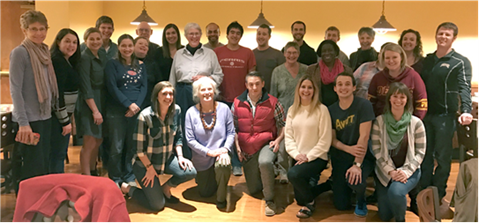Professors Marsh have been stalwarts of the Denver legal community for generations
The Marsh Inn of Court strives to continue the legacy of excellence of Professors Thompson and Lucy Marsh established in their classrooms through education, camaraderie, and community outreach to those in need. Learn how you, through your active participation in our Inn can continue these great traditions by joining the Executive Committee.
Thompson Marsh believed people who can sue over wrongdoing have the responsibility to do so, especially because there are so many who are unable to. Lucy Marsh put that sentiment into action in 2013, when she filed a gender discrimination claim with the Equal Employment Opportunity Commission (EEOC) against her employer, The University of Denver Sturm College of Law, for violations of the federal Equal Pay Act and Title VII of the Civil Rights Act on gender discrimination. Professor Marsh learned she was the lowest paid full professor, despite her decades of service and the many honors and awards she earned. In addition, all female law full professors were being paid substantially less than their male counterparts.
Professor Marsh went through the EEOC because she wanted the decision to have a broader impact, to resolve the issue for more than just herself, which it did. Ultimately, seven female professors joined the lawsuit. Professor Marsh also wanted to ensure private institutions were required to follow the law as well. “The concept of ‘lean in and negotiate,’ especially for women,” Professor Marsh says, “is not applicable when it comes to the law of equal pay.”

January, 2017 Tribal Wills Project Team
When asked about her decision to continue teaching at DU, Professor Marsh refers to something her father used to say, “Enjoy your classroom and forget the rest of it.” Her development of and commitment to the Tribal Wills Project is evidence of her putting that advice into action. In 2013, John Roach, a fiduciary trust officer at the Office of the Special Trustee for Indian Affairs, U.S. Department of the Interior, reached out to law schools requesting assistance in developing estate planning documents for Native Americans, Professor Marsh was the only professor to respond. “The Tribal Wills Project allows University of Denver law students to travel to American Indian reservations at the invitation of the tribes to spend a week drafting wills, medical powers of attorney, living wills, and burial instructions for tribal members. The students gain valuable experience interviewing clients, providing counsel, and drafting legal documents, with the assistance of volunteer attorneys.” (See www.law.du.edu/index.php/tribal-wills-project)
Join us today and reap the rewards for years to come!